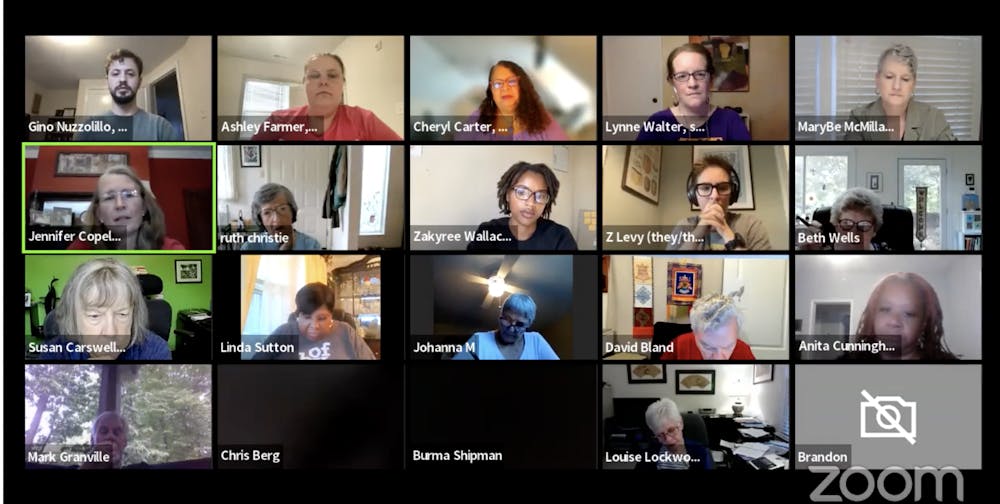North Carolinian advocacy group leaders gathered in a virtual town hall to discuss the upcoming U.S. Supreme Court case Moore v. Harper, a North Carolina gerrymandering case, on Thursday evening.
The event was hosted by the Southern Coalition for Social Justice and drew more than 100 attendees. It introduced Moore v. Harper, assessed the implications of the case and rallied for a voting coalition for the upcoming 2022 midterm elections. The refrain of the evening: “We the people put people over politics.”
The Supreme Court will hear oral arguments for Moore v. Harper in October. The issue at the heart of the case—intense partisan gerrymandering—has been an ongoing issue in state politics.
After an introduction by SCSJ Communications Advocate Gino Nuzzolillo, SCSJ Co-Executive Director Allison Riggs explained the facts of the case. In 2019, the Supreme Court ruled Rucho v. Common Cause that state courts,not federal courts, hold the power to review cases of partisan gerrymandering based on their state constitutions.
In February, the North Carolina Supreme Court voted 4-3 to strike down a highly gerrymandered election map proposed by the GOP-controlled legislature. The plans favored the Republican party to an extent that, in almost any political environment, Republicans would win 10 out of 14 seats.
The GOP legislature proposed a second gerrymandered map, prompting a state court to order a special master to create a fair map for the 2022 congressional elections. Unwilling to accept the outcome, two Republican legislators asked the U.S. Supreme Court to reinstate their gerrymandered map—this being the Moore v. Harper case.
The legislators’ argument hinges upon independent state legislature theory, which holds that the power to determine the “fairness” of an election is delegated to the state legislature. Adopting independent state legislature theory would leave functions such as drawing maps and setting voting rules in the hands of state legislators, removing a long-standing check of the governor and state judiciary.
Representatives championing causes from racial justice to reproductive rights spoke about what Nuzzolillo called “one of the most important cases for our democracy.” These organizations included N.C. State AFL-CIO, Planned Parenthood South Atlantic and North Carolina Black Alliance.
N.C. AFL-CIO President MaryBe McMillan emphasized the importance of the vote and urged people to remain politically active.
“Through the power of our vote, we can create shared prosperity for all of us. Legislative leaders know that, and that is why they have been hell-bent on undermining our power,” she said.
Ashley Farmer, advocacy campaigns manager of Planned Parenthood South Atlantic, added that the outcome of Moore v. Harper would have important ramifications on abortion access.
“The same states actively working to suppress the right to vote are the same ones working to erode people’s access to reproductive healthcare,” she said.
Farmer also claimed that gerrymandered maps would further harm communities that have been disproportionately impacted by the overturning of Roe v. Wade, such as the working class, people of color and LGBTQ+ individuals.
LaMeshia Wittington, North Carolina Black Alliance’s Deputy Director of Programs, was the final speaker. She spoke to the ruling’s effect on Black voters and environmental justice causes. Wittington explained the history of gerrymandering as a voter suppression tactic, drawing a connection between the past and the present.
“They packed Black voters into a district called the Black Second, and at the same time, corporations were dumping chemical waste and filth into the same neighborhoods through landfills, through plantations that turned into corporations, using old Jim Crow-era lines,” she said.
In addition to Thursday’s meeting, the SCSJ will be traveling to all 100 North Carolina counties to host educational events in the weeks leading up to Moore v. Harper. The ruling will likely be handed down summer 2023.
As the town hall drew to a close, Nuzzolillo left the audience with a final reminder of the importance of the case: "Nothing less than the future of multiracial democracy is on the line."
Get The Chronicle straight to your inbox
Signup for our weekly newsletter. Cancel at any time.

Sevana Wenn is a Trinity sophomore and features managing editor of The Chronicle's 118th volume.

